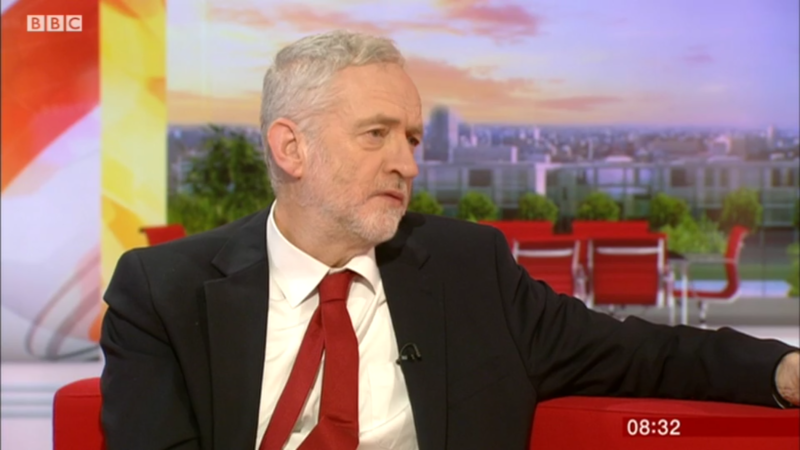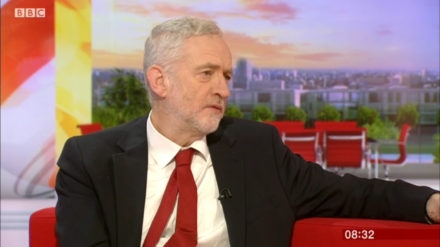

Today, Labour is 18 points behind in the polls. Let’s take a moment to think about that. Labour is so far behind in the polls and we are nearly two years into a new parliament. We have just lost a by-election in Copeland – a seat we’ve held for 82 years – and clung on to Stoke-on-Trent Central with a reduced share of the vote. Jeremy Corbyn has a net unfavourable rating with every demographic, in every region of the country, both genders and all income groups.
In recent months, even his most enthusiastic cheerleaders such as Owen Jones, Abi Wilkinson and Ellie Mae O’Hagan have been forced to withdraw their support in the face of this impending electoral disaster. His former chief of staff-turned-campaign chief has resigned and numerous officials turned their backs on the leader’s office long ago. The question of whether Corbyn should resign has now morphed into the question “when will Corbyn resign?”, due – in no small part – to rumours from his own office that he has privately set a date for his departure.
To be frank, it’s now clear that Corbyn is not even considering the possibility that he might be the next Prime Minister. Realistically, the only question Corbyn must ask himself is whether he wants to defend his perceived professional reputation among some Labour members as the ‘principled-nice-guy’ of politics or bow out before he loses this too?
From the moment Corbyn received the 35 required nominations from the parliamentary Labour party to secure his candidacy a campaign was launched not only to portray him as a man of principle, but also a nice man. An honourable man. The only person who could usher in “a better kind of politics”.
Like all effective campaigns, this simple message captured the hearts and minds of its target audience and suddenly Corbynistas were joining Labour at a rate previously thought impossible. Less widely acknowledged, is how this portrayal of Corbyn as “a principled politician” permeated into the consciousness of not only current party members, but even outspoken Corbyn-sceptics like me. In the early months of the first Corbyn campaign, I would often catch myself saying “Yes, he’s a principled man, but I’m not sure he has the right principles”. I now see that I was wrong to mitigate my criticism in this way.
Throughout Corbyn’s leadership his credentials for having principles have been his greatest asset. They shielded him from criticism over his lacklustre campaigning to keep Britain in the EU. It was also the basis for the narrative that effectively won him the second leadership election – “the nasty PLP are ganging up on poor Jeremy”.
Stories in the press which might at first appear to undermine Corbyn’s persona as a ‘principled politician’ included his past association with) groups such as the IRA and Hamas, which run counter to his stated principles of anti-violence, anti-racism and anti-discrimination. Whilst these stories have the effect of turning members of the public off Corbyn, they actually serve to bolster his core-support. They are viewed by the Corbyn-faithful as smears by the political establishment and a hostile press, prepared to stoop to guilt-by-proxy attacks on Labour’s Leader in a desperate attempt to discredit him.
However, it will not be Corbyn’s past conduct that proves he is not a man of principle, but rather how he conducts himself in the run-up to 26 September 2017 when Labour Party Conference will vote on the McDonnell amendment.
This amendment to the Labour party’s constitution would lower the nominations required for a new Labour leadership candidate from 15 per cent of MPs and MEPs to just five per cent. It would effectively mean that a Labour MP could find themselves on the leadership ballot with support from just 15 of their colleagues, as opposed to 38 under the current rules. It has been named after the current Shadow Chancellor who is desperate for a third run for Leader of the Labour Party.
John McDonnell denies that he has leadership ambitions, despite being the obvious successor to Corbyn, not only as one of the original architects of Corbynism, but also because he is viewed by fellow Corbynites as a somewhat more of a true believer than Corbyn himself.
There has been a lot of speculation about Corbyn’s position following the terrible and just-about-not-terrible by-election results last week. In truth, no election result is likely to be a definitive factor in whether Corbyn stays or goes. They will, however, dictate the pace at which his personal appeal begins to crumble, as they will demonstrate just how badly Corbyn could damage the Labour Party, simply to delay the leadership contest until after September 2017.
Sadly, there are no signs that Labour’s electoral prospects are set to improve and, if more elected representatives resign, there could be any number of local or even parliamentary by-elections in the next seven months, as well as local elections in May. Each electoral test will chip away at Corbyn’s carefully crafted façade as a ‘principled politician’. Labour party members will start to question what is principled about continuing as leader whilst Labour representation in parliament and on councils plummets? Before long they will start to question what is honourable about destroying the electoral prospects of a party he has served for over 35 years? By the time it becomes apparent it was all to ensure his closest friend and ally got a run at the leadership, it will be too late – his reputation as a “principled politician” will be in tatters.
Matt Pound is the National Organiser for Labour First, you can follow him on twitter @mattydpound




More from LabourList
‘Labour council candidates – it’s tough, but all is not lost’
‘Labour won’t stop the far right by changing leaders — only by proving what the left can deliver’
‘Cutting Welsh university funding would be economic vandalism, not reform’